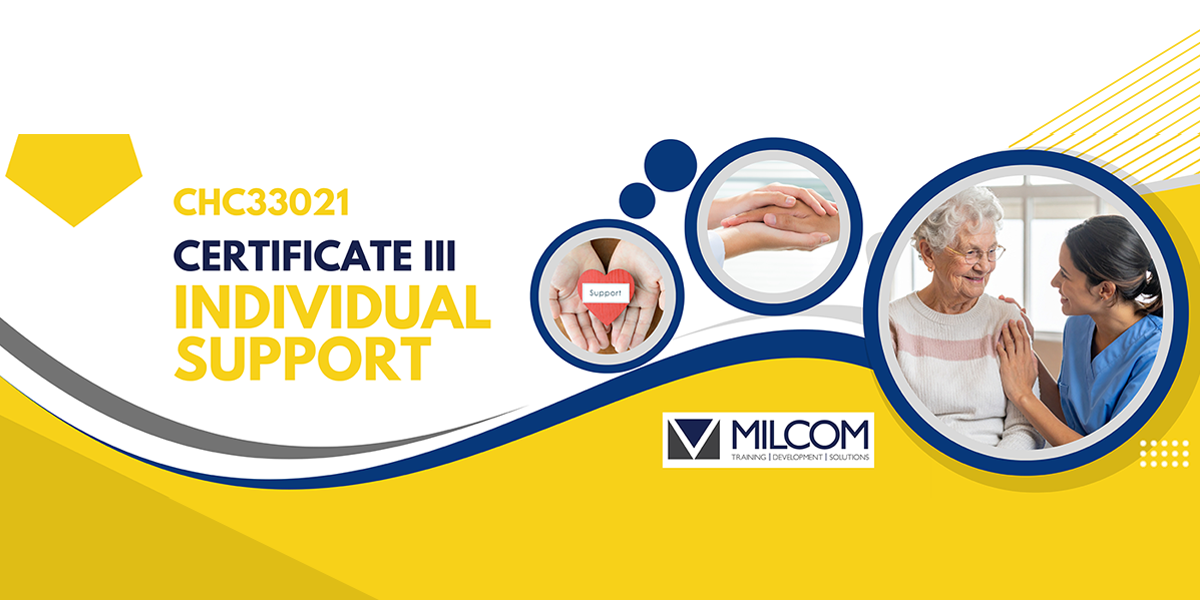This qualification reflects the role of individuals in a community, home or residential setting who work under supervision and address the needs of clients within an aged care or disability support context.
These individuals take responsibility for their own outputs within the scope of their job role and delegation of duties. Employees have a range of factual, technical and procedural knowledge, as well as some theoretical knowledge of the concepts and practices required to provide person-centred
support.
The skills in this qualification requires the use of work practices in relation with Commonwealth and State/Territory legislation, Australian standards and industry codes of practice.
To achieve this qualification, the candidate must have completed at least 120 hours of work as detailed in the Assessment Requirements of the units of competency. These hours are mandatory for demonstrating competence in the practical components of the course
You will learn how to:
- help those who might be suffering from dementia other illnesses or disabilities.
- stop falls.
- promote wellbeing and independence.
- learn how to communicate in the fields of community services and health.
- work in residential care environments.
Entry Requirements:
There are no entry requirements however a
- National Criminal History Check, obtained at the student’s expense, is mandatory.
- a working with Children Check; and
- a NDIS Worker Screening Check.
- Have successfully completed Australian year 12 or equivalent.
- Are at least at age of 18 at the time of commencement of the course.
- LLN and Pre-training review are required to be completed to assist in identifying whether this qualification is appropriate for the education and employment aspirations of the target learner and to identify student’s needs for additional support during their study.
Depending on the placement provider, students may also need to obtain
Milcom Institute has the following admission requirements:
Duration:
This course is timetabled for:
Fee For Service – Minimum 6-8 months
Delivery Method:
Blended (Online)
Workplace Based
Delivery Locations:
Victoria
Queensland
New South Wales
South Australia
Work Placement Requirement:
The CHC33021 Certificate III in Individual Support qualification has mandatory work placement hours.
This is in the core unit CHCCCS040 Support independence and wellbeing which requires 120 hours of direct support work.
Work placement can be completed at your current place of employment if all requirements can be met as per Assessment criteria.
If you are not currently employed in chosen industry, it is recommended that finding a suitable work place to complete work placement as soon as enrolled into qualification.
Pathway Information:
Completion of CHC30121 Certificate III Individual Support can serve as a pathway to further education, like the Certificate IV in Disability Support.
Fees:
| Indicative scheduled hours | 950 |
| Enrolment fee (non- refundable) (Payment Plans available) | $3500.00 |
| Tuition Fee Learner Contribution | $560.00 |
| Listed non- tuition fee for traineeships/Apprenticeship under Skills First | $325.00 |
Fees can be paid upfront or a payment plan can be organised.
Payment Plans information will be provided at time of request.
Key Learning Outcomes
- Provide person-centred support: Learn to deliver tailored, compassionate care that respects the dignity and choices of individuals with ageing or disability needs.
- Communicate and work in health and community services: Develop skills to collaborate effectively with clients, families, supervisors, and other healthcare professionals like nurses and case managers.
- Support independence and wellbeing: Assist clients with daily living activities, personal care, and mobility to enhance their independence and overall wellbeing.
- Implement safe work practices: Understand and follow work health and safety (WHS), infection control, and emergency procedures in a care setting.
- Understand and address diverse needs: Develop awareness of cultural diversity, the specific needs of people with dementia, and how to support clients with different physical, social, and emotional needs.
- Complete administrative tasks: Learn to follow individualised support plans and complete documentation, reporting, and other administrative tasks as required.
- Work ethically and legally: Understand and apply legal and ethical frameworks to support workers in their role.
Employment Opportunities
Upon successfully completing the course, graduates will be qualified to apply for a variety of roles in the healthcare and community services sector.
Potential job titles include:
- Assistant in Nursing
- Personal Care Assistant
- Care Service Employee
- In-Home Respite Worker
- Community Care Worker
- Community Support Worker
- Disability Support Worker
- Transport Support Worker
Course Structure
| CORE |
|---|
| CHCCCS031 Provide individualised support |
| CHCCCS038 Facilitate the empowerment of people receiving support |
| CHCCCS040 Support independence and wellbeing |
| CHCCCS041 Recognise healthy body systems |
| CHCCOM005 Communicate and work in health or community services |
| CHCDIV001 Work with diverse people |
| CHCLEG001 Work legally and ethically |
| HLTINF006 Apply basic principles and practices of infection prevention and control |
| HLTWHS002 Follow safe work practices for direct client care |
| ELECTIVES |
| Group A electives – AGEING specialisation |
| CHCAGE011 Provide support to people living with dementia |
| CHCAGE013 Work effectively in aged care |
| CHCPAL003 Deliver care services using a palliative approach |
| Group B electives – DISABILITY specialisation |
| CHCDIS011 Contribute to ongoing skills development using a strengths-based approach |
| CHCDIS012 Support community participation and social inclusion |
| CHCDIS020 Work effectively in disability support |





